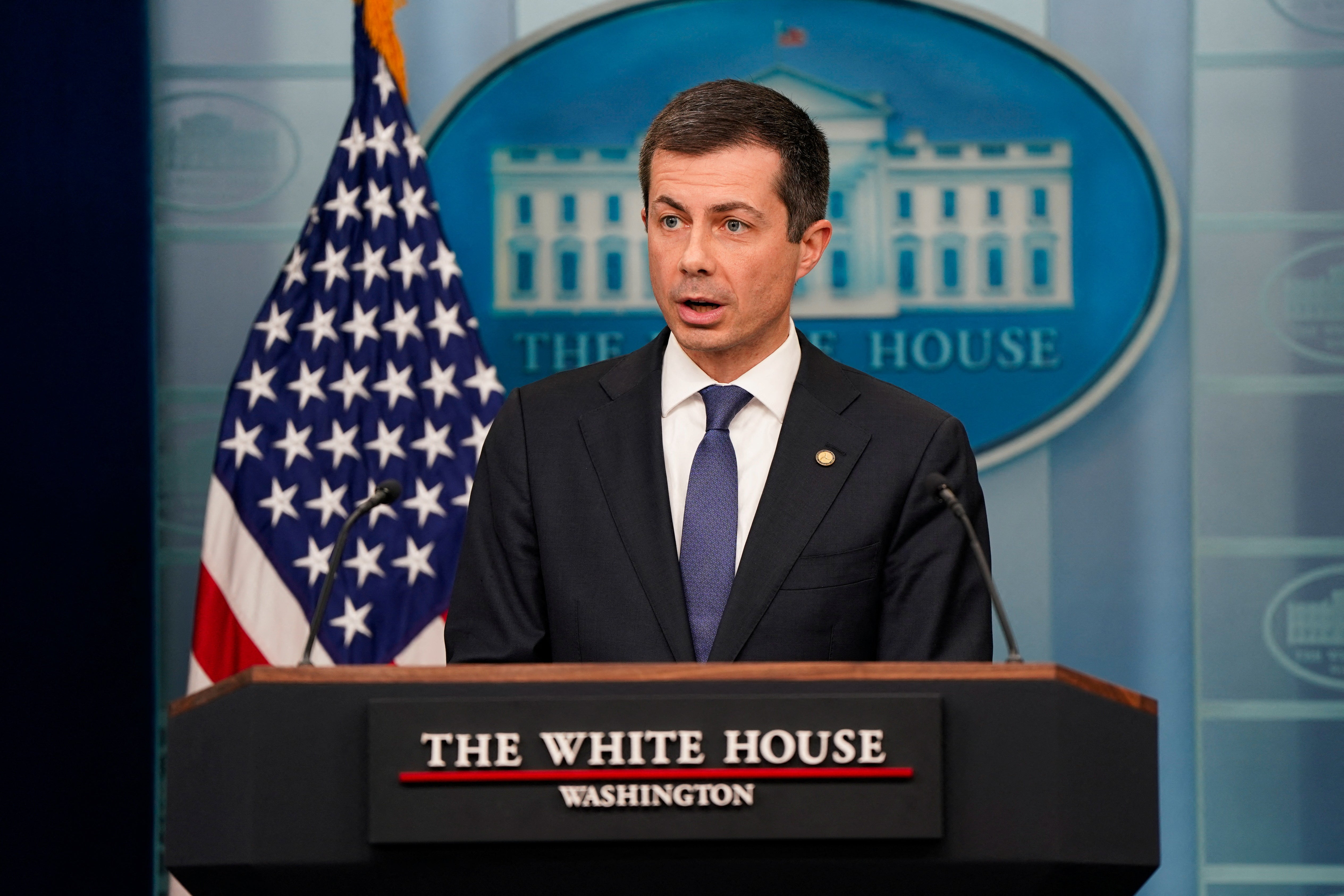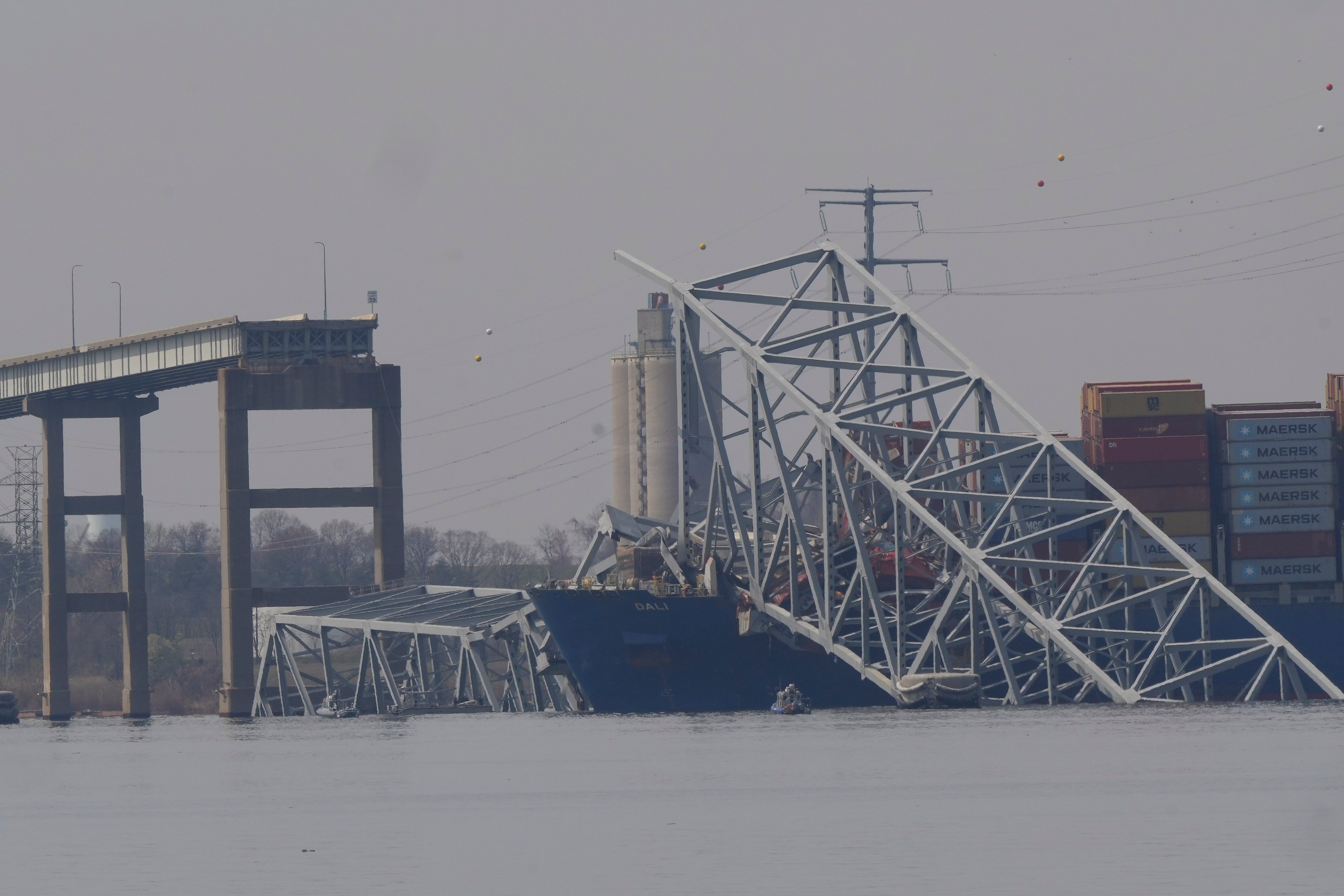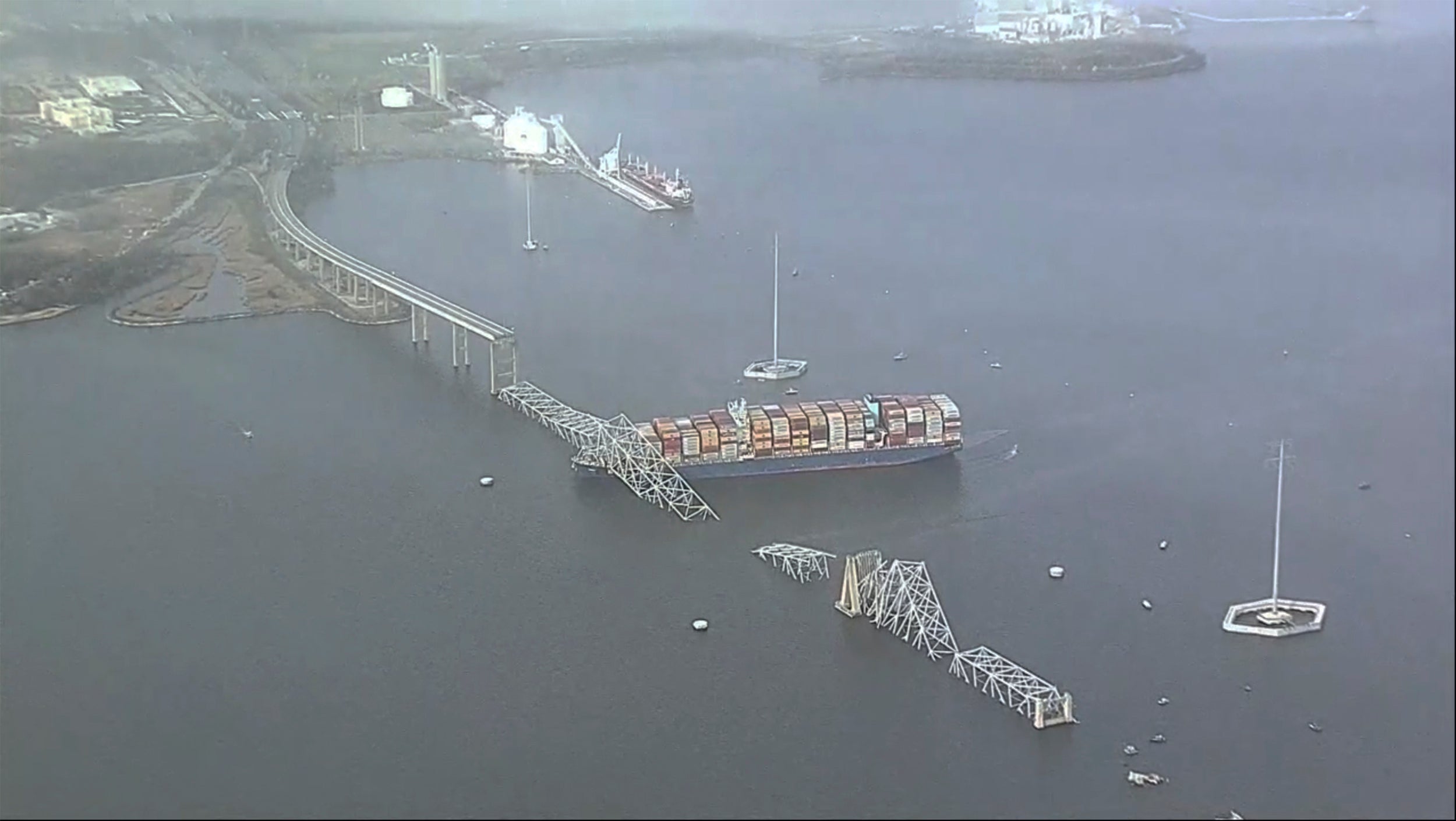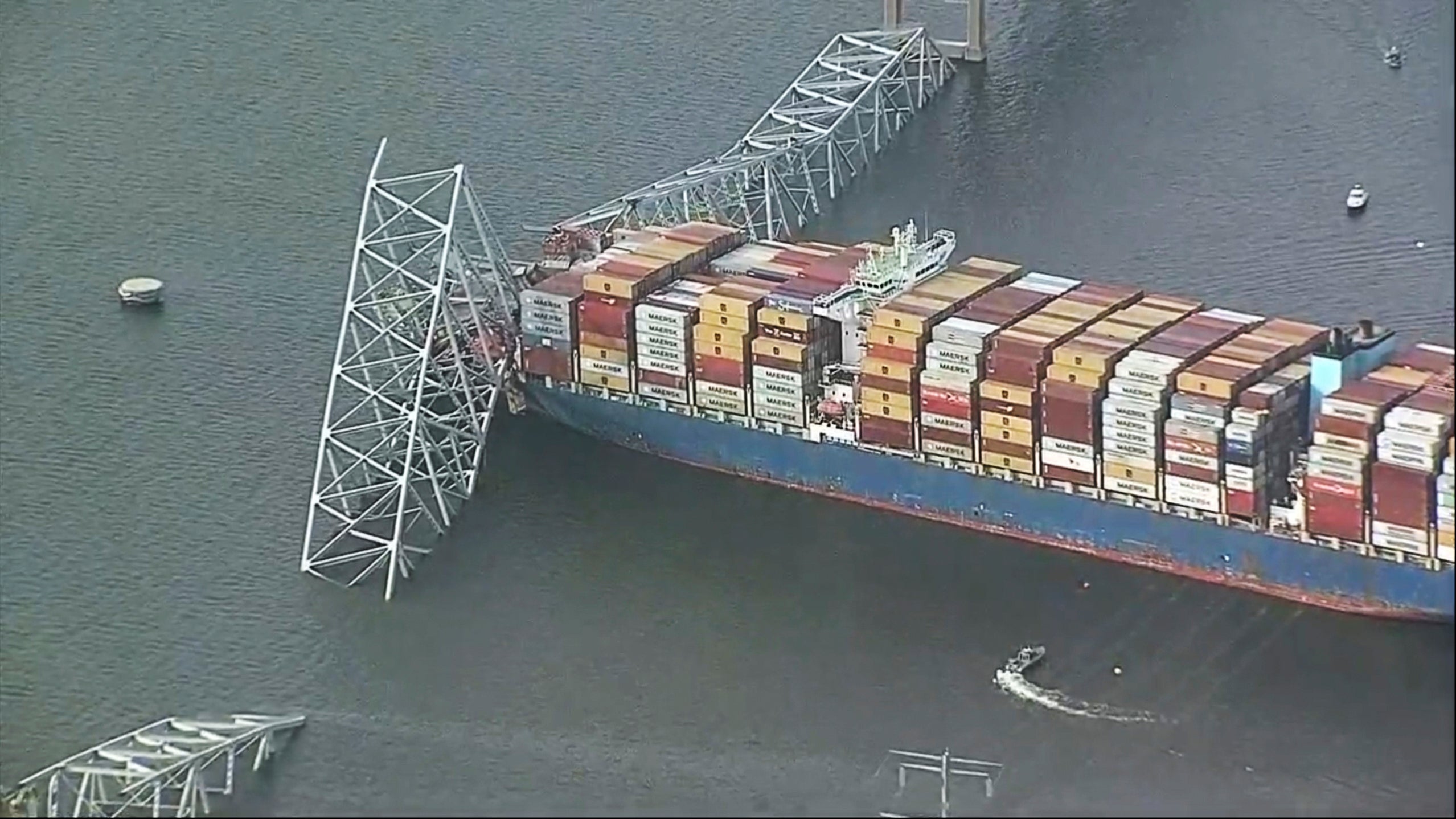Baltimore bridge collapse sparks trade disruption with unusable port – what economic impact will it have?
US Secretary of Transportation Pete Buttigieg said that a ‘main area of concern’ was also the livelihoods of port workers, with around 8,000 jobs directly associated with port activities
The Singapore-flagged Dali container ship has shut down the Port of Baltimore indefinitely after it collapsed the 1.6 mile long Francis Scott Key bridge on the east US coast.
Around a dozen cargo ships were estimated to be stuck inside the port unable to leave as the bridge spans the only route in and out of the harbor where it is located. Another 30 small small cargo ships, tug boats and pleasure craft were also in the port, while about 40 heading for Baltimore were forced to divert
US Secretary of Transportation Pete Buttigieg said that a “main area of concern” was the livelihoods of port workers, telling a press conference on Wednesday that thousands of jobs could be affected by the incident.
Baltimore handled 52.3 million tons of foreign cargo last year worth about $80.8bn. The port was the second busiest for coal exports last year, with its eight dry bulk terminals exporting 22 million tonnes of coal last year and small amounts of other metals and minerals.
One temporary channel was opened on Monday to accommodate some ship traffic. Officials are working on creating an additional two, with the second expected to open in the oncoming days. The third depends on whether officials are able to clear the harbour of the wreckage.
At the moment, shipping companies are utlising ports around the East Coast. Two cruise lines are operating out of Norfolk, Virginia, until normal traffic can resume. Companies that normally carry goods into the port should also be able to utilise nearby ports.
At a White House press briefing on Wednesday, Mr Buttigieg addressed the impact of the crash on the local economy, saying that some 8,000 jobs were directly associated with port activities.
“Last I checked... about $2m in wages are at stake every day and that’s one of the areas we are concerned about,” he said.

“It’s one thing for a container or vehicle or a shipment to be absorbed or accommodated somewhere else, but these longshore workers – if goods aren’t moving, they’re not working.
“Right now there is work taking place even inside of that bridge because of the work that has to be done to offload some of the vehicles that are that are stuck there and get that back on the surface transportation to go out to other sites, so they’re likely working right now, but that work won’t last long and that’s one of our main areas of concern.”
Mr Buttigieg added that economic effects would “ripple out beyond the immediate region,” saying: “This is an important port for both imports and exports and it’s America’s largest vehicle handling port, which is important not only for car imports and exports, but also for farm equipment.
“No matter how quickly the channels can be reopened, we know that it can’t happen overnight, and so we’re going to have to manage the impacts.”
Mr Buttigieg said that lessons on similar economic disruption had been learned from the coronavirus pandemic. The bipartisan Infrastructure Investment and Jobs Act was, passed by the Biden administration in 2021, pledged to “rebuild America’s bridges” as well as “ease inflationary pressures and strengthen supply chains by making long overdue improvements for our nation’s ports...”
The establishment of a freight office within the transportation department as part of the act “allows us to create coordination” when dealing with incidents such as the crash, Mr Buttigieg said.
“Tomorrow, I will be convening shippers and other supply chain partners to understand their needs and to promote a coordinated approach as they adapt to the temporary disruptions while we plan mitigations,” he told reporters.
“That said, the Port of Baltimore is an important port. So for our supply chains, and for all the workers who depend on it for their income. We’re going to help to get it open as soon as safely possible... Rebuilding will not be quick or easy or cheap, but we will get it done.”
The Francis Scott Key Bridge took five years to build. When asked how long it would take to re-open the port, Mr Buttigieg replied: “Reopening the port is a different matter from rebuilding the bridge.
“The port, that’s just a matter of clearing the channel – still no simple thing – but I would expect that can happen on a much quicker timeline than the full reconstruction of the bridge.”
During other news conferences since the incident, officials have refused to speculate on how long the effort would take. Maryland Governor Wes Moore has repeatedly said that rebuilding the bridge would not take weeks or months.
Experts have also warned that despite disruptions in Baltimore being only “temporary” there could be long-term impacts on global trade and insurance premiums as a result of Monday’s incident.

Andrew Tettenborn, Professor of Commercial Law at Swansea University, said there could be a short-term impact on global trade in the coal industry, but added that the “US are good at diverting” coal exports.
“A lot of the trade will be picked up elsewhere,” he said.
Asked about the indefinite blocking of the port, he said: “Even if it is blocked for a time, I wouldn’t think it would have an enormous effect.”
Zaili Yang, Professor of Maritime Transport at Liverpool John Moores University, said the impact on global trade would be minimal as it isn’t as integral to trading lines as the likes of the Suez Canal.
“As per its effects on global trade, I think it is less likely compared to the Suez Canal blockage given the locations of the two are different,” he said.
“My personal opinion is its effects in the maritime sector shall be more on safety than economy and unlikely to be cascaded to the associated maritime supply chains.”
He added that the real impact of the crash will be on the inspection and protective measures for avoiding any other similar bridge collapse by ship collisions.
“It will and shall be done through a two-way solution, ship anti-collision by regulatory bodies such as the IMO (international Maritime Organization) and bridge structure reinforcement by domestic transport authorities,” he said.

“Anti collision measures could be developed from operational (improved safer procedures for marine officers), engineering (anti-collision poles surrounding the supports of the bridges on the main navigational channels) and technological (early detection and warning by advanced technologies such as AI).”
The cost of the damage caused to the bridge and any loss of life could be paid through a liability pay-out from a P&I club, a non-for-profit association in which member shipowners pool their insurance premiums to pay claims on a mutual basis.
When a claim exceeds $10m, it is shared between the 12 International Group of P&I Clubs.
Just like with car insurance, if there is a major claim, or a high number, the renewal for members can go up.
Speaking to The Independent, David Walton, director of UK-based commercial insurance brokers Bromwell Ltd, said the industry was well equipped to deal with such incidents, although he said the cost of freight could rise as a result through an increase in insurance premiums.
And Mr Walton said it was a similar picture for insurance policies for marine cargo, with container damage and delays likely to also lead to claims.
He said: “It is bad what has happened, people may have died, and it is quite severe, but when you look the amount of cargo that is being moved it is quite a big market so it will have repercussions but not necessary as severe as you may think because the insurance policies are underwritten to have large losses.”

Asked if it could lead to a rise in costs for consumers receiving goods like cars exported by vessels around the world, he said: “It is too early to say. Potentially a rise in premiums could pass along the line but I think with liability insurance the way it is underwritten, both marine cargo and marine liability, they are underwritten to absorb quite large claims.
“So quite often it will have an impact on the account of that claim, but it is not necessary going to have a huge impact on that part of the industry. It’s not necessarily disastrous. It’s going expensive but insurance is there to underwrite to the correct level to be able to absorb a large claim. It couldn’t take a lot of large claims, but it could take a large claim.”
The Dali, owned by Grace Ocean Ptd Ltd, comes under the Britannia P&I Club.
A spokesperson for the club told The Independent: “We are working closely with the ship manager and relevant authorities to establish the facts and to help ensure that this situation is dealt with quickly and professionally.“In the meantime, our thoughts are with everyone affected by this incident.”
Join our commenting forum
Join thought-provoking conversations, follow other Independent readers and see their replies
Comments
Bookmark popover
Removed from bookmarks